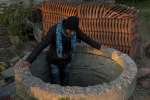- Text size
 |
|  |
|  |
| 
- عربي
UNHCR, civil society warn of growing detention problem in Asia-Pacific
News Stories, 11 November 2013
BANGKOK, Thailand, November 11 (UNHCR) – Growing numbers of refugees and asylum-seekers are being detained in the Asia-Pacific region as states increasingly use detention to deter irregular migration, UNHCR and its partners have warned.
These concerns were raised at a regional consultation on immigration detention for south and south-east Asia held last week in Bangkok. Co-hosted by UNHCR, the Asia Pacific Refugee Rights Network (APPRN) and the International Detention Coalition, the Thursday-Friday meeting brought together members of the region's civil society, national human rights institutions as well as other UN agencies and other partners.
As a principle, the UN refugee agency opposes the detention of people seeking international protection. It believes that detention should only be used as a measure of last resort where it is determined to be necessary and proportionate in each individual case.
In the Asia-Pacific region, rough estimates put the number of detained refugees and asylum-seekers at nearly 14,000 – up from 11,500 a year ago and some 7,800 in 2011. These figures are based on cases that UNHCR knows of, but is believed to be just the tip of the iceberg.
Of those currently detained, more than 13 per cent are women, including pregnant women, and a similar proportion are children, some of them on their own. Many detainees have been held for years with no prospect of release.
"In south and south-east Asia, few countries have signed the 1951 Refugee Convention and the legal framework is weak," said Thomas Vargas, UNHCR's senior regional protection advisor in Bangkok. "As a result, refugees are often considered illegal migrants under immigration law, and immigration detention is used for migration management."
APPRN Coordinator Anoop Sukumaran agreed: "Detention is increasingly being used as a stick to prevent people from fleeing persecution across borders. We need to find ways either to take the stick away, or at least make it soft enough so it doesn't hurt."
Worrying trends in recent months include the increasingly automatic detention of people arriving irregularly by boat in some countries, and a rise in incidents of airport arrivals being detained and threatened with deportation despite having valid travel documents. Stateless people, such as the Rohingya, are particularly vulnerable to arbitrary and indefinite detention as there are no clear solutions and nowhere to deport them to. Children and other groups with specific needs also face particular hardships in detention.
"Many people will be shocked to know that so many children are languishing behind bars," said UNHCR's Vargas. "I hope that we can work together to ensure that there are no asylum-seeking children in detention in the next five years."
In September last year, UNHCR issued updated guidelines on the detention of asylum-seekers to provide advice to governments and other bodies that make decisions on detention. The guidelines outlined alternatives to detention that include releasing people of concern to the community with reporting requirements, or housing them at designated reception centres with guaranteed freedom of movement.
Last week's consultations in Bangkok explored ways of engaging with governments and experts to encourage alternatives to detention and meanwhile to improve conditions for those in protracted detention.
In Thailand, for example, hundreds of Rohingya women and children identified in anti-trafficking raids earlier this year were released to shelters run by the Ministry of Social Development and Human Security. UNHCR has been advocating for the Rohingya men currently in overcrowded immigration detention centres to be relocated to sites with enhanced freedom of movement and access to basic services as well as to allow for family reunification.
In Indonesia, irregular boat arrivals are routinely held in immigration detention, where UNHCR registers and processes asylum claims. Unaccompanied children, families and vulnerable groups are prioritized for release to community housing managed by the International Organization for Migration.
Participants at the Bangkok meeting agreed it was important to learn from and build on good practices in finding alternatives to detention. They also stressed the need to improve the mapping of people of concern in detention, and to provide systematic training to officials working in immigration and other relevant departments.
Advocacy was identified as another priority – not only to sensitize governments on the rights of refugees and asylum seekers, but also to raise awareness among host communities and build on the tradition of generosity towards refugees in the region.
































